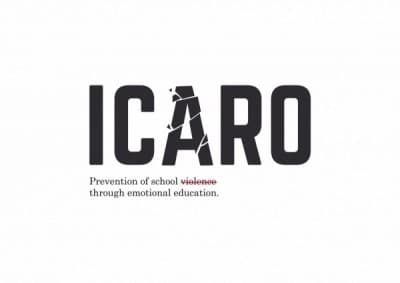ICARO - Preventing school violence and exclusion through emotional education
Project number: 2016-1-ES01-KA201-025508
Programme/ action/ field: Erasmus + KA201, Strategic partnership for school education
Coordinator: Asociacion Cultural Euroaccion Murcia (Spain)
Project duration: 01.09.2016 – 31.08.2019
Project website: www.icaro-project.com
The ICARO proposal intends to plan and develop specific innovative actions to prevent and reduce violence in schools among children between 11-16 years old, through the realization of research, training, counselling and support for teachers, students and parents by using non-formal education, holistically approach and personalized support.The objectives of the project are:- To assess the professional needs of teachers regarding the work with youngsters with difficult behaviours (such as violence, bullying episodes and other forms of youth violence), both as perpetrators or victims;- To create new specific curricula for teachers, educators, social and youth workers aimed at enable them specific competences for identifying, developing and enhancing their skills to deal with violent and difficult behaviour of students.- To create a Manual with new tools and approaches based on non-formal education, holistically approach and personalized support to combat violence in schools and students´ family environment;- Acquiring the necessary competences and skills for teachers from schools that do complementary activities in schools for managing and exploiting methods and approaches to work with students with violent and difficult behaviour in classes. The target groups are the students with violent and difficult behaviours with edges between 11 and 16 years old, their families and their teachers. We expect to involve directly 120 students, 50 families and 200 teachers from the following countries: Spain, Italy, Slovenia and Poland.Nowadays teachers are dealing with many difficulties in order to develop their daily work. The bureaucracy for implementing and adapting new curricula and new educational reforms, lack of time and interest in training, the lack of support and trust from pupils´ families, lack of knowledge, skills and competences to deal with students with special needs and violence behaviour, unstructured families, lack of knowledge of the human being development stages etc. . Students that have violent and difficult behaviours usually come from families that face different difficulties, such as: addictive problems, violent behaviour, cultural difficulties, lack of control and limits within the family, lack of time and interest among parents in paying attention to their children, most of them broken families. This project was born originally in Spain at local level when Euroaccion was requested by the Regional Authorities for Education to organize a series of workshops in several secondary schools of Murcia in order to prevent youth criminality, bullying and other type of disruptive behaviours among the pupils. As a result of that initiative and due mainly to its success, we agreed with partners from other countries to give it a try to that local project, implementing it at transnational level. The innovative aspects are based in several arguments: first of all, we all share the same challenges and needs about preventing youth violence and it would be very enriching to establish synergies among us to improve and further develop a joint strategy, involving non formal learning methodologies, emotional education approaches and Gestalt therapy, and thus to deal effectively and prevent youth violence in secondary schools. Second aspect of innovative character of this project is based in the use of new methods coming from humanistic approaches such as Gestalt psychotherapy or Emotional Education, because such approaches are neither used nor even known by the communities of teachers and practitioners in the formal educational field. A third element that speaks about the innovative dimension of ICARO is the fact that families will be taken into consideration when working with the youth, as they are a fundamental pillar in the educational process of young people. All efforts to prevent violence in the schools would be useless if at home, violence is still an issue and it is part of the pupils' lives.Another element that brings innovation to the project is the lack of experiences or best practices in the partners' countries where there are real and effective examples of projects that combined formal and non-formal education methodologies.Last but not least, we would like to remark that all the partners in our consortium share the same concerns, interests and feel that we all have a common challenge in our countries when it comes to youth violence. ICARO project is based in our conviction that other type of education (Emotional Education) is needed in order to prevent such type of attitudes and problems in our educational centres.
Who do we cooperate with?
- ISIS Follonica – Italy
- Institut IVIZ – Slovenia
- Solski Center CELJE – Slovenia
- IES – Eduardo Linares Lumeras – Spain
- REDU – Rete Educare ai Diritti Umani – Italy
- TUCEP – Tiber Umbria Comett Education Programme - Italy
- EUROACCION – Asociacion Cultural Euroaccion Murcia – Spain
- Publiczne Gimnazjum nr 40 im. Wandy Rutkiewicz w Łodzi - Poland
How to contact us?
Contact to the national coordinator: j.komorek@medyk.edu.pl


